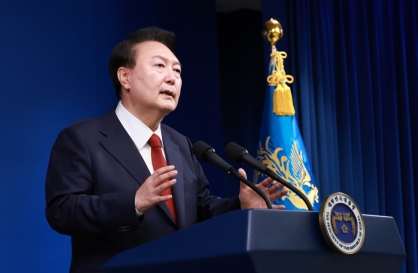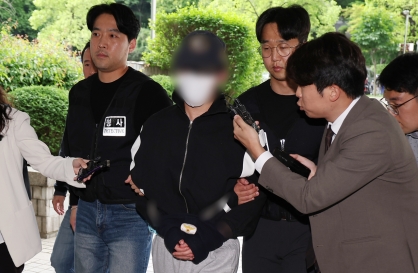Success of Abe's visit to U.S. depends on how he honestly apologizes for wartime history: NYT
By KH디지털2Published : April 21, 2015 - 09:14
The success of Japanese Prime Minister Shinzo Abe's visit to the United States depends on how honestly he faces up to the country's wartime past, the New York Times said, as Abe strongly indicated he won't issue a new apology.
Abe is scheduled to make a weeklong visit to the U.S. next week amid calls for him to use the visit, which includes an address at a joint meeting of Congress, to offer a sincere apology for Japan's wartime atrocities and mend fences with neighboring nations.
"The success of the visit also depends on whether and how honestly Mr. Abe confronts Japan's wartime history, including its decision to wage war, its brutal occupation of China and Korea, its atrocities and its enslavement of thousands of women forced to work as sex slaves or 'comfort women' in wartime brothels," the newspaper said in an editorial.
It is "the fault of Mr. Abe and his right-wing political allies" that history tensions have not been settled yet, the editorial said, accusing them of "questioning history and even trying to rewrite it, stoking regional tensions."
"Mr. Abe may have more to say on all this on Aug. 15, the actual date of the surrender. But his remarks to Congress will send an important signal," it said.
Abe plans to issue a statement on Aug. 15 to mark the 70th anniversary of the end of World War II. Abe has said he would include in the statement Japan's remorse over the war and how the country will contribute to the region and beyond.
But on Monday, Abe said he sees no need for the upcoming statement to repeat previous statements of apology the country has issued, strongly suggesting that the planned statement is unlikely to include an apology for Japan's wartime history.
"Now that I've said I'll succeed them, we don't need to write them again," Abe was quoted as saying on Japan's Fuji television in response to a question whether the August statement would include such expressions as aggression and apology.
The New York Times noted that even though Abe has expressed remorse and said he would honor Japan's past apologies, he has "added vague qualifiers to his comments, creating suspicions that he doesn't take the apologies seriously and will try to water them down."
The paper also accused Japan of trying to whitewash wartime history, pointing out the Japanese education ministry's efforts to force textbook publishers to recast descriptions of historical events to conform to the government's "official, less forthright analysis."
Though Abe hopes to establish Japan as a 21st-century leader that can help the U.S. counter China in Asia and take on other global responsibilities, Japan "cannot credibly fill that broader role if it seeks to repudiate criticism of its past," the paper said. (Yonhap)
Abe is scheduled to make a weeklong visit to the U.S. next week amid calls for him to use the visit, which includes an address at a joint meeting of Congress, to offer a sincere apology for Japan's wartime atrocities and mend fences with neighboring nations.
"The success of the visit also depends on whether and how honestly Mr. Abe confronts Japan's wartime history, including its decision to wage war, its brutal occupation of China and Korea, its atrocities and its enslavement of thousands of women forced to work as sex slaves or 'comfort women' in wartime brothels," the newspaper said in an editorial.
It is "the fault of Mr. Abe and his right-wing political allies" that history tensions have not been settled yet, the editorial said, accusing them of "questioning history and even trying to rewrite it, stoking regional tensions."
"Mr. Abe may have more to say on all this on Aug. 15, the actual date of the surrender. But his remarks to Congress will send an important signal," it said.
Abe plans to issue a statement on Aug. 15 to mark the 70th anniversary of the end of World War II. Abe has said he would include in the statement Japan's remorse over the war and how the country will contribute to the region and beyond.
But on Monday, Abe said he sees no need for the upcoming statement to repeat previous statements of apology the country has issued, strongly suggesting that the planned statement is unlikely to include an apology for Japan's wartime history.
"Now that I've said I'll succeed them, we don't need to write them again," Abe was quoted as saying on Japan's Fuji television in response to a question whether the August statement would include such expressions as aggression and apology.
The New York Times noted that even though Abe has expressed remorse and said he would honor Japan's past apologies, he has "added vague qualifiers to his comments, creating suspicions that he doesn't take the apologies seriously and will try to water them down."
The paper also accused Japan of trying to whitewash wartime history, pointing out the Japanese education ministry's efforts to force textbook publishers to recast descriptions of historical events to conform to the government's "official, less forthright analysis."
Though Abe hopes to establish Japan as a 21st-century leader that can help the U.S. counter China in Asia and take on other global responsibilities, Japan "cannot credibly fill that broader role if it seeks to repudiate criticism of its past," the paper said. (Yonhap)









![[K-pop’s dilemma] Time, profit pressures work against originality](http://res.heraldm.com/phpwas/restmb_idxmake.php?idx=644&simg=/content/image/2024/05/08/20240508050705_0.jpg&u=20240508171126)








![[Today’s K-pop] Stray Kids to drop new album in July: report](http://res.heraldm.com/phpwas/restmb_idxmake.php?idx=642&simg=/content/image/2024/05/09/20240509050659_0.jpg&u=)